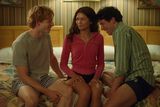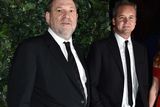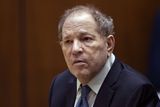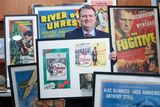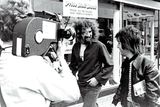The Fury of war - Brad Pitt's new World War Two epic
Like all good soldiers, Brad Pitt did as he was told. He even brawled with his co-stars, because that's what they were asked to do. "Brad kicked me in the nuts three times," says fellow actor Jon Bernthal, "but I punched him in the stomach, so I guess that's even."
Pitt smiles at the recollection. The punch from Bernthal was one of the hardest he's ever received, he concedes, but he didn't bitch or moan. He and Bernthal play members of a tank crew in the hard-hitting WWII film, Fury, and they were asked to behave like warriors - especially in the week-long preparations that preceded the shoot - and if that meant punching and kicking each other, so be it.
"If we were ordered to do push-ups, I was first on the ground," Pitt says when we catch up with him at the Bovington Tank Museum in Dorset, England. "When in class, I studied hard. I never whined or complained," he adds. "In fact, you want to get some punches thrown at you so you can throw some back."
It seems almost ludicrous to believe that Pitt was scrapping with fellow actors, but his director on his latest film, David Ayer, is well known for demanding that his cast members endure a thorough grounding in the world they're set to enter.
When making the critically acclaimed cop film End of Watch, for example, he sent actors Jake Gyllenhaal and Michael Pena out on 'ride alongs' with the Los Angeles Police Department, and Gyllenhaal watched as a real-life murder victim died in front of him.
In the run-up to Fury, meanwhile, Ayer organised a week-long boot camp in Hertfordshire, England, which was run by a US Navy SEAL. The five-man cast feature as members of a Sherman tank crew fighting in Europe in April 1945, and throughout the boot camp, they were asked to live authentically to the time, in tents, away from their families. They were also asked to act like real soldiers and Ayer instructed them to fight each other.
"If you really want to find out about someone, punch them in the face," Ayer tells me. Pitt went along with it. "Brad is humble and you don't get the movie star baggage," adds Ayer. "You don't get the entourage. He will stand in the mud and eat the cold sandwich with you."
For all the hardship, Pitt did ask his family to visit the film set during the 12-week shoot in the southern English countryside. "They visited the set and my oldest son [Maddox] knows about every tank," says Pitt, who in August this year he married long-time partner, Angelina Jolie, in France, "so much so, that when we first started, I was asking him for info! He has an extensive knowledge developed on his own since he was younger.
"Then I brought my five-year-old [Knox]on set and he was awed by the tank," he adds, "and even though he had no concept of war or a tank's purpose, he was immediately drawn to it. I think it's that inexplicable fascination man has for machine."
It is a fascination felt keenly by Pitt, who along with fellow cast members Bernthal, Shia LaBeouf, Michael Pena and Logan Lerman, learned all there is to know about a Sherman tank. They could easily operate a Sherman for real, note the tank experts at Bovington, which will please WWII enthusiasts.
The writer-director is a military enthusiast himself, having served on submarines in the US Navy, and he bids to bring real veracity to the film. Fury is an unflinching study of men at war and few will deny the authenticity of the combat scenes. When compared to the wholly inaccurate classic Hollywood pictures like Battle of the Bulge, Fury goes a long way to redressing the balance.
"I am a fan of David Ayer, from Harsh Times to End of Watch," says Pitt, a three-time Oscar nominee as an actor, courtesy of Twelve Monkeys, The Curious Case of Benjamin Button and Moneyball. "In his films, I recognise a knowing that is beyond mine. I knew I could learn something from this man, and that, for me, is everything. Dave has lived an extraordinary life, including time spent on a nuclear sub."
Pitt is very choosy when it comes to filmmakers. He has worked with the best - David Fincher, Terrence Malick, Tarantino, the Coens, Steven Soderbergh, Alejandro González Iñárritu, Robert Redford, Ridley Scott and Steve McQueen, to name but a few.
"There is a handful of filmmakers where I certainly respect what they are doing," he says. "I like people who are doing something authentic, questioning the medium, having an authentic voice and having a very, very precise point of view.
"I am actually very snobbish about directors because, ultimately, it is the director's medium and we are in their hands. So you have to learn to say, 'No,' sometimes. It is the most powerful word that we have in our business and it is one that takes a little while to learn, actually. But you have got to protect yourself sometimes."
It was Ayer's extensive knowledge of, and his respect for, the military that drew Pitt into Fury. "It drew us all in," he says. "I knew upon the first read that there was something very special and truthful here. I didn't know or recognise how deep it ran until we all started working together and came out on the other side. It was truly a unique experience."
The actor is no stranger to WWII pictures, having starred in Tarantino's Inglourious Basterds, but he was very much the elder man among the actors on Fury and he says that he felt a certain responsibility towards his younger co-stars.
"The whole experience was a profound education on leadership," he says, "and it was my responsibility to set the tone. This was true whether the camera was rolling or not. And, as you can imagine, we got really, really tight on this thing."
The cast spent an inordinate amount of time cooped up in the shell of a Sherman tank and though the 50-year-old Pitt says that he is not a great talker, still he felt compelled to lend his advice to the younger actors around him. Lerman, for example, is only 22.
"I am not the most talkative by nature," he says, "but here we were, five guys stuck in a tin can and I'm the senior of the bunch, and I felt this responsibility to be direct and open with my guys.
"And I root for them because our industry is a very discombobulating place, especially for young actors today. I worry for them because they get used up so quickly and spat out before they have had time to develop their craft."
The biggest responsibility that Pitt felt, however, was reserved for the combat veterans with whom he talked during pre-production. "I've seen the hellish photos from the time and I've read the books," he says, "so sitting in the presence of these extraordinary men, who have lived and survived war, and were willing to share their experiences with the five of us, was quite moving."
Could Pitt ever have imagined himself in the military? "No, I was too reckless, rudderless, so I never considered it in my younger days. I was too much on the drift and it was more about exploring for me.
"Now, though, with what we've learned and what we've been through on this film, I have so much respect for what we ask these young men and women to do on our behalves. I have so much admiration for them.
"My hope is that they will recognise some of that in this film."
Fury is in cinemas now.
Join the Irish Independent WhatsApp channel
Stay up to date with all the latest news
